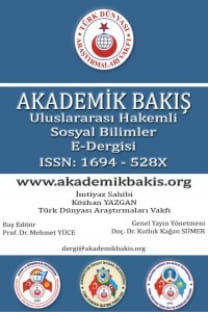DEVLET GÜDÜMÜNDEKİ MEDYADAN ÖZEL SERMAYE MEDYASINA GEÇİŞ: TURGUT ÖZAL DÖNEMİ MEDYA SERMAYE YAPISININ DEĞİŞİMİ
Medyanın temel işlevi toplumun doğru ve gerçek haber almasına yönelik tarafsız ve bağımsız haber ve/veya yayın yapmaktır. Demokrasinin ve çoğulculuğun tam olarak işlediği gelişmiş toplumlarda, medya hem toplumun bilinçlendirilmesi ve gerçekleri öğrenmesinde en etkili araç, hem de toplum adına siyasileri ve siyasal sistemi denetleyici rol üstlenmektedir. Türk medyası, başlangıcından 1980li yılların ortalarına kadar geçen süreçte çeşitli faktörlerin etkisi olmakla birlikte ekonomik bağlamda devlete olan bağımlılığı nedeniyle tarafsız ve bağımsız olamadığı gibi, gelişmiş ülkelerdeki örneklerinde olduğu gibi bir güç haline dönüşememiştir. 1983 yılında Turgut Özalın iktidara gelmesi ile başlayan liberalleşme süreci ile birlikte, medyanın sermaye yapısındaki değişim hızlanarak, kısa sürede özel sermayenin egemen olduğu bir medya yapısı ortaya çıkmıştır. 90lı yıllarda televizyon yayıncılığındaki TRT tekelinin kırılması ve özel sermayenin televizyon yayıncılığının önündeki yasal engellerin kalkması ile medyanın her alanında özel sermaye ve özellikle birkaç sermaye grubunun hakimiyeti artmıştır. Mülkiyet yapısı ile tekel konuma gelen medya aktörleri medya gücünü, medyanın toplumsal sorumluluk ve işlevini yerine getirmekten ziyade çıkarlarını korumak ve kazançlarını arttırmak amacıyla kullanmış, bu amaç doğrultusunda yeri geldiğinde siyasiler ve hükümetler üzerinde baskı kurmaktan hatta kamuoyu oluşturmak suretiyle hükümetlerin yıkılmasında aktif görev almaktan çekinmemişlerdir. Dolayısı ile medyanın sermaye yapısındaki değişim, medyanın özgürlük ve bağımsızlığından ziyade belli başlı grupların çıkarlarının ön plana çıkarıldığı bir tekel medyasının oluşmasını sağlamıştır.
FROM THE STATE-LED MEDIA CONVERSION TO A PRIVATE CAPITAL MEDIA: MEDIA CHANGE THE CAPITAL STRUCTURE OF THE PERIOD TURGUT ÖZAL
The main function of the media and society's right to get the real news for impartial and independent news and / or broadcast. Democracy and pluralism are fully committed developed countries, the most effective tool in learning and media awareness of the society and the facts, but also plays a role on behalf of society, politicians and the political system controller. Turkish media, start from the last process until the mid-1980s in the economic context although the impact of various factors due to the dependence of the government cannot be impartial and independent, could become a force as is the case in developed countries. The liberalization process began with the arrival to power of Turgut Özal in 1983, in conjunction with the pace of change in the capital structure of the media, the dominant media structure has emerged of private capital in a short period of time. The breaking of the monopoly of private capital in the 90s TRT television broadcasting television broadcasting and with the removal of legal restrictions on the media, and especially the dominance of capital in all areas of the few private equity group has increased. The monopoly position of the media with actors from the ownership structure of the media, the power of the media and social responsibility and protect their interests rather than fulfilling the function used in order to increase their earnings, for this purpose, or even by creating public opinion to put pressure on politicians and the government to take active roles in the collapse of the government hesitated. Therefore, the change in the capital structure of the media freedom and independence, rather than the interests of certain groups to the forefront of the media helped to establish a monopoly has been removed.
